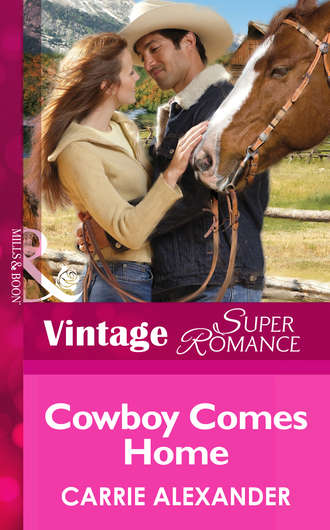
Полная версия
Cowboy Comes Home

“Everything’s a choice.”
“Like the way I chose to take the blame for the fire when the deputy came to question me,” Rio said. “I knew the consequences, Meg, but I did it because I wanted to protect you. I loved you.”
An acrid thickness welled up inside Meg’s chest, pushing tears into her throat, her eyes. She took a deep breath, holding on by the fingernails she dug into her palms. “I appreciate that, Rio. Really, I do. But I wish you’d told them the truth.”
“I didn’t know the truth,” he said quietly. “You were gone.”
Dear Reader,
In Cowboy Comes Home, the hero and heroine both return to Wyoming after many years away. So have I—fictionally speaking. Eight years ago, I wrote my very first Harlequin Superromance, The Maverick, with the small-town setting of Treetop, Wyoming. A good creation never dies—at least in my imagination—so when I decided to write a story featuring a reformed bad girl, a cowboy hero and a ranch named Wild River, I knew I had to return to Treetop.
To refresh my memory, I revisited The Maverick for the first time since it was published. Fun research. (Though slightly scary, since it was way too late to revise!) Then I reread parts of Mary O’Hara’s Wyoming-set “Flicka” series, which are among my favorite books from my horse-crazy years. Even more fun. Sometimes being a writer is the best job in the world.
I hope you enjoy this Wyoming reunion story. Cowboy Comes Home is my ninth Harlequin Superromance book—with more to come. And it all started in Treetop….
Happy reading,
Carrie Alexander
P.S. Visit me on the Web at www.carriealexander.com, where you can also find my backlist and drop me a line.
Cowboy Comes Home
Carrie Alexander

ABOUT THE AUTHOR
Carrie Alexander lives and writes among the birches and pine trees in Upper Michigan, where she enjoys gardening (sporadically), swimming (when it’s warm enough), collecting sticks and stones (they breed in her yard), and waiting for football season (Go Pack!).
CONTENTS
CHAPTER ONE
CHAPTER TWO
CHAPTER THREE
CHAPTER FOUR
CHAPTER FIVE
CHAPTER SIX
CHAPTER SEVEN
CHAPTER EIGHT
CHAPTER NINE
CHAPTER TEN
CHAPTER ELEVEN
CHAPTER TWELVE
CHAPTER THIRTEEN
CHAPTER FOURTEEN
CHAPTER FIFTEEN
CHAPTER SIXTEEN
CHAPTER ONE
MEG LENNOX HELD OUT one hand, offering a palmful of sweet feed to the balky gelding showing her his hind-quarters. Behind her back she clutched the rope attached to the halter hung off her shoulder. The way the horse had reacted to her previous attempts to catch him, she might as well have been throwing a rattlesnake around his neck.
The chestnut lashed his tail. He wasn’t easily fooled.
“Quiet now.” She chirruped, shaking her palm like a gambler with hot dice. “Don’t you want your dinner?”
Sloop’s ears flicked back and forth. His head turned as if he might be persuaded, but the one visible eye rolled with suspicion, showing a white rim.
She stood still, even though the temptation to sidle closer was strong. The horse was almost within touching distance, the closest she’d come to catching him during their half-hour battle of wills.
“Hey, Sloop. Good fella. There’s nothing to be afraid of. Don’t run away.”
Don’t run away? The words pinched Meg’s conscience. She’d always been good at running away.
She gazed past the fence and the weather-worn barn to the rolling pastures of Wild River Ranch. It was early October in Treetop, Wyoming, and the rich grassy greens of summer had faded to tan and ochre. The upright stands of high-country aspen marched up the foothills in golden epaulets.
She’d loved the ranch, but not her life here. Ten years ago, at barely eighteen, she’d left behind her home and contentious relationship with her gruff, uncaring father. Forever, she’d thought.
But in all the years she’d searched, she hadn’t been able to find the good life she’d expected. When times had gotten really tough, she’d instinctively fled back to Wyoming. To the ranch. Even though it hadn’t been home for a long time, even in her heart.
Especially in her heart.
Meg turned her sigh into another crooning overture to Sloop. Some days, her hopes for the ranch—and herself—seemed as unattainable as the stubborn gelding.
She’d returned too late. Both parents were dead, the land neglected. Her prospects were as bleak as the metallic-gray sky.
But I’m home at last, even if it’s only half a home. That’s something.
She chirruped again. “Sloop. Please let me catch you. It’s gonna rain.”
The horse didn’t mind being out in the rain, but she hadn’t hammered and nailed the box stalls into shape for her own amusement. Renny and Caprice were already inside, pulling at the hay nets, their grain long gone. Only Sloop was being stubborn. His owner had warned her that the horse could be hard to catch. Meg had been certain she’d have no trouble. Once upon a time, she’d had a reputation for being good with horses.
Sloop swung around, his nostrils fluttering. The delayed dinnertime was finally getting to him.
She opened her hand. The feed was moist and fragrant in her palm. “There you go,” she soothed him. “One more step and you’re mine, you ornery old rat-tailed nag.”
Ears twitching, the horse extended his nose to inhale the grain. She raised her other hand to his neck, sliding the halter rope across his flaxen mane.
She was just reaching around to catch it into a loose lasso when a truck burst around the bend, frame rattling, gears grinding. The flock of starlings that had been pecking along the fence line rose suddenly. Sloop flung up his head and wheeled away with a snort.
Meg threw the halter on the ground. “Dammit!”
She strode to the fence, calling a surly “What do you want?” at the driver of the pickup truck.
The door opened. A man stepped out. “Is that any way to greet an old friend?”
Meg stopped with one leg slung over the top railing. Everything inside her had seized into one tight, hard lump. Her shock felt an awful lot like pain.
The voice was deeper, rougher. But she recognized it, even if the face and physique were a stranger’s.
Rio Carefoot.
Her first love. The boy whose life she’d carelessly ruined on the night she ran away.
The man she’d most dreaded facing up to, even ahead of her dad.
Meg dropped back down into the dirt, keeping the fence between them. As if Rio had any chance of getting close to her. She’d wrapped barbed wire around her heart.
“Rio,” she said flatly. “You’re not supposed to be in Treetop.”
“Neither are you.”
“I’ve been back since July.”
“Three days for me.”
Meg grabbed the fence rail to steady herself. She didn’t want Rio to know how badly she was thrown. “What brings you here?”
He glanced away. “My mother’s still around.”
She understood the underlying implication. “Around” meant living in as a housekeeper for William Walker Stone on his multimillion-dollar spread east of town. Any Treetopper asked would have said that Rio returning to the Stone ranch was about as likely as Meg coming back to her father’s place.
Well, look at them now. There must be some fine skating in hell.
“I heard that,” she said. He was glowering. Still holding a grudge? “But I meant here. Wild River.”
“You wrote an ad. Help Wanted.”
The classified ad for a stablehand had been running in the Treetop Weekly for the past month. She’d had two applicants, a kid who could only work after school, and the town drunk who had a history of holding odd jobs only long enough to fund his next bender. She’d taken the kid’s number.
Rio rested his hands on his hips, face turned to follow Sloop, who was prancing at the far end of the pasture. Rio wore jeans and a chambray shirt beneath a new-looking leather jacket lined in fleece. The black hair she’d once braided down his back barely reached his collar. He’d filled out some during the past decade, but the weight was all broad shoulders and lean, hard muscle. He’d be twenty-nine now. One year older than herself. Only one, yet even when they were kids he’d been the wiser and nobler one. He’d already known that love could mean sacrifice.
She still hadn’t looked into his eyes. Her gaze was fixed somewhere near his left shoulder.
Rio’s Adam’s apple bobbed. “Room and board, the ad said, plus a small salary.”
“You’re applying for the job?”
“You’re shocked.”
“What—” She bit the inside of her lip. “My dad passed away. It’s just me here now.”
“So I heard.”
“Right. Even though I swore I’d never return.” With all the fervor of a hot-blooded teenager who had no idea of how rough life could really get.
Rio’s eyes narrowed. “Why did you?”
“I had nowhere else to go,” she said before she could stop herself. Rio didn’t have to know that she’d retreated here, a failure. If he realized how barren her life had become, he might get the idea that she was looking for more than help with the horses.
He nodded perfunctorily. “I know what that’s like.”
Meg could sympathize. While her dad had been a hard, emotionless man with no idea how to raise a daughter, Rio’s father had never even acknowledged him. Of course he’d understand what it felt like to be homeless. Her estrangement had been her own choice.
She cleared her throat, hoping to keep the shakiness out of her voice. “You’ve been in the army all this time.”
“Yeah. Until five weeks ago.”
He’d been deployed to heavy action in Afghanistan several times, she’d heard around town. There were old acquaintances eager to fill her in. Stop-lossed the last time, they’d said, called back to action just when he’d thought he was out for good. His mother had been devastated.
Meg’s eyes squeezed shut. My fault.
She certainly owed him a job, at the least. Why he’d want work as a stable hand was a mystery she’d have to consider later. Right now, the prospect of having Rio live on the ranch with her was almost incomprehensible. Only in a small, hidden place deep inside had she ever considered seeing him again. Making it up to him.
She wasn’t ready for any of that.
“I don’t think it’s going to work out,” she said. The part-time kid would have to do.
Rio didn’t question her. He moved along the fence. Sloop had stopped showing off and was watching them with his head hung low, his ribs bellowing. The bucket of grain she’d been using to lure him was parked nearby.
“How many horses?” Rio asked.
“Just three.” Her training and boarding business wasn’t off to a flying start. “But I’ve got two more coming to board for the winter—” maybe “—and I thought I’d pick up a few green prospects at the fall auction in Laramie. Work with them through the winter, sell for a profit in the spring.”
Rio shed his jacket. “Make you a bet.”
“What?” Once she’d have taken up any challenge, but she’d lived in Vegas the past six years. Wagering was a losing game.
“If I can get that horse into the barn within ten minutes, you’ll hire me on a trial basis.” He didn’t wait for her assent, just climbed the fence and picked up the bucket and the halter. He coiled the rope neatly, watching her out of the corner of his eye. Much like the stubborn chestnut, except his whites barely showed.
Rio had dark eyes, a deep midnight blue that was nearly black. Her reflection in them used to make her feel beautiful, though the girl she’d seen in the mirror had been anything but.
Meg looked at her grimy hands. She wiped them on her equally grimy sweatshirt. “His name’s Sloop.”
Rio didn’t play coy. He walked directly to the gelding, cutting a swath through the fawn-colored field. She heard him murmuring—a soft, velvety sound that brought back memories of teenage trysts in the tight, enclosed space of his pickup truck. Lying together in the cool grass by the river. Their bodies tangled and wet in the hot golden light of the haymow.
She closed her eyes. They’d been sixteen and seventeen. Too young to know that they were playing with fire.
“Sloop,” Rio said softly, making her look again. He might as well have said sweet, the way he used to when he kissed her.
The horse’s ears were on a swivel, flicking back and forth. He’d thrown up his head. His flanks quivered as Rio approached. But he didn’t move.
Rio held out the bucket. Sloop lunged for it. The halter went on so fast the feat seemed almost a sleight of hand.
“That was no fair,” Meg called. “I wore him down for you.”
Rio’s sandpaper chuckle drifted across the pasture. “You ought to know, Meggie Jo. All’s fair in love and war.”
She flinched. She hadn’t been called Meggie Jo in a very long time. Only her mom and Rio had been allowed to use the nickname, though her father had often said Margaret Jolene Lennox in his most forbidding tone, when he’d been calling her to his study for another dressing down.
Rio rubbed a hand along the horse’s neck, giving Sloop a moment with the grain before he took the bucket. Meg got her emotions in check and went to push the corral gate open wider, then the Dutch door to the box stall, even though both were already ajar.
Rio, living on her ranch. That couldn’t possibly work.
But why not? First she could make it clear that she wasn’t looking for any sort of romantic reunion, and then she could make amends. If that even mattered anymore, so many years after she’d made a wreck of both their lives.
Rio led Sloop into the stall. The horse was docile now that he’d been caught, nickering hello to his stablemates, then nudging his nose at Meg to prod her into fetching his feed.
She ran her hand along the gelding’s flank, moving slowly only because Rio stood on the horse’s other side and suddenly the stall seemed smaller than before.
He looked at her over the chestnut’s withers. “Flashy horse. Registered?”
“AQHA.” American Quarter Horse Association. “Bonny Bar’s Windrunner, which somehow got translated into the stable name Sloop. He belongs to a woman from town. She’s a beginner, but she hopes to show him next summer. I’m going to work with them till then.”
“Look at me, Meg.”
Her throat ached. “I can’t.”
“I’m only me.”
“It’s been ten years and then some.”
“We’ve both changed. But I still know you. You know me, too.”
She met his eyes. A searing heat sliced through her, the arc of a flaming arrow. She pictured Rio, bare chested, bronzed and beautiful as he pulled back the bowstring.
She forced out the words. “That’s why it won’t work.”
“Or why it will.”
She was afraid of that, too.
“Why do you want this job? It’s nothing. Not challenging or rewarding. Hardly any pay. And isolated.”
“Exactly what I’m looking for. See, it’s the room and board that’s valuable to me. I can do the work easily and still have time for…other things.”
“Like what?”
The horse shifted between them, curving his neck around to nuzzle at Meg.
“That’s personal,” Rio said.
She eyed him.
“Nothing sinister,” he said. “Just a project I’m working on.”
“All right, if that’s the way you want it.” She ducked beneath Sloop’s neck and took the bucket from Rio. His fingers brushed against hers, but she jerked away, trying to make it look as though she’d only been moving toward the stall door. She went to the feed bins and dipped out a couple of scoops, then returned to tip the bucket into Sloop’s feed pan.
Rio was already filling the hay net. “Give me a week,” he said. “A trial.”
Her head snapped back. Trial. He’d used the word twice now. On purpose? To remind her what she owed him, after almost putting him on trial for a crime he hadn’t committed?
She secured the bottom half of the Dutch door. No, Rio wouldn’t taunt her with the past. Her guilty conscience was talking again, a voice she’d managed to drown out for the past ten years with a loud life that had ultimately said nothing at all.
At Wild River, the silence spoke. Too loudly. She’d be grateful to have another person around. They might even be able to reestablish their old friendship.
But never their status as lovers. Never.
“I’ll show you the bunkhouse,” she said abruptly. “You might change your mind.”
RIO REMEMBERED the bunkhouse. Even back then the one-room cabin had been run down, as dark as a cave. The Lennoxes had had a hired man, an old cowboy named Rooney. He’d chewed tobacco, tied flies that never caught fish, kept a string of sleazy paperbacks in his back pocket that he’d read in the barn in between chores. Meg had been the bane of his existence, with her mischief making and harum-scarum horseback riding.
Rio lifted the limp curtain that hung at the cabin’s only window. The view was of the river that cut through the property, deep, black and turbulent. Rooney had fished there, futilely. Rio and Meg had shot the rapids on their backsides.
“Do you remember the time you put cayenne pepper into Rooney’s tobacco tin?”
Meg almost smiled. “He’s dead now.” She bent over a small square table, wiping a thick layer of dust with her sleeve. “He’s dead, too,” she added to herself.
“He must have been seventy when I knew him.” Rio tried the lamp. “There’s electricity.” He crossed to the bathroom, outfitted with a rust-spotted claw-foot tub and cast-iron sink. The pipes clattered before blatting a brown stream into the bowl. “And water.”
Meg had pried a book from beneath the table leg. The table wobbled when she dropped the curled paperback on top of it. “The place needs work. I’ll clean it out and get a new mattress. Set some mousetraps.”
Rio moved over to examine the faded cover of the book. A buxom blonde with a gun winked up at him. Jezebel’s Revenge. Cover price forty-five cents.
“Are you saying I have the job?”
“If you want it.”
“I want it.”
She let out a breath, clearly exasperated with him. “Have you turned crazy in your old age, Rio Carefoot?”
He’d been crazy for her. Crazy for a green-eyed girl with rebellion streaming through her veins. The Meg of his youth hadn’t given a flying fig that he was a rootless outsider, halfway Crow, who’d never had a home of his own.
No real father either. But there’d always been his mother, who’d wanted him only to be good and get along. Virginia Carefoot hadn’t approved of her son’s fatal-attraction friendship with Meg, but after sending him away to one failed summer at the Montana rez with his grandparents, she’d run out of ways to keep them apart.
“What about you?” he asked Meg abruptly, not willing to acknowledge that, for him, the attraction hadn’t faded. She was still a part of him, even though he’d been sure he’d never see her again. “Where have you been all this time?”
“Around.” She circled the room, poking at the secondhand furnishings, as restive and uneasy as the young Meg. “Vegas, mostly. I arrived on the back of a motorcycle and left in a thirdhand Camaro with bad brakes, so you can guess how well I did there.” She rubbed her palms, drawing his eyes to the tattoos encircling her wrists. On the right, a ring of flame. The left, a blue band of waves.
“What did you do there?”
She pulled at her sleeves. “A little bit of everything—waitressing, clerking, answering phones at a call center. Pink-ghetto jobs. Then for nearly two years, I was on the city crew that did nothing but change lightbulbs. It was nice to be outdoors.”
“Huh. And how many does it take to change a lightbulb?”
She rolled her eyes. “You’re not the first to ask that eternal question. The guys’ standard answer was that now that they had a woman on the crew, the screwing had become a spectator sport. They were a rowdy bunch.”
Rio wanted to leap to her defense, even now. “You should have found a new job.”
“Eventually I did. There was some trouble and I was let go. So long, cushy city benefits.” Shadows shuttered the expression on her downturned face. “My dad always said I’d amount to nothing.”
“But he left you the ranch.”
“No one else wanted it. If he’d ever had friends, he’d chased them away long before he died.”
“Were you here at the end?”
She nodded behind a curtain of hair. “I came home. A neighbor—Mrs…. um…Mrs. Vaughn—she tracked me down off a Christmas card I’d sent the old man. But he didn’t want me. He told me to leave, to come back only after he was six feet deep.”
Rio looked at her, the bed between them. He’d have liked to go to her, but again he stopped himself. Even the young Meg had been prickly about accepting affection. This Meg had Hands Off branded across every inch of her.
“That was three years ago.” She brushed her hair over her shoulders. It was the same—long and straight, the color of pecans dipped in taffy. With her slim body and tawny skin, she’d always been camouflaged, easy to lose among the tall reeds and saplings of their endless summers. But she’d been free-spirited then. Now her camouflage seemed like the stillness of a wild creature frightened of capture.
Rio gave a soft grunt. “Don’t worry. We’ll set the old place to rights.”
Meg had moved to the door they’d left standing open. “I want this clear from the start—there is no ‘we.’ That’s over. I’m not looking for…you know. I don’t need a partner. You’d be just the hired hand.”
He gazed at her. “Of course.”
Her wide mouth pulled taut. “I’m sorry if that was harsh.”
“No, it’s good to know where we stand. This is only a job for me.”
“Then we’re clear.” Her eyes darkened despite what she’d said.
“Clear enough for now.”
“I mean it, Rio. I’m done with men.”
He followed her out the door. She’d always been a man’s woman. Never interested in girlie things when there were horses to ride, fast cars to drive, dares to take.
But someone had hurt her badly.
He hoped it wasn’t him.
CHAPTER TWO
AS SOON AS the rattle of Rio’s retreating truck had died, Meg slammed into the house. Tears welled in her eyes. She dashed them away impatiently. She didn’t cry.
But, oh, sometimes she really wanted to.
She pressed her knuckles into her abdomen. If only she could have had every organ removed after the last miscarriage, instead of just getting her uterus scraped. Maybe then she’d feel nothing except emptiness.
“For God’s sake,” she sneered after catching sight of herself in the cloudy mirror near the front door. “What a load of melodrama.”
Her mother had been a fine melodramatist, according to her dad. Meg remembered her as being sweet, fanciful and loving. But also weak. Emotional. Needy.
“Not fit for ranch life” had been the common diagnosis after Richard Lennox’s wife, Jolene, had slid from the occasional bleak mood into a deep depression. The townspeople had clucked over the way their daughter had been allowed to run wild.
They hadn’t known the worst of it. Not until, at age eleven, Meg had found her mother cold and lifeless in her bed, bottles of pills scattered across the blankets. In the community, there’d been whispers of suicide. Her father had refused to accept the possibility. The autopsy had come back as an unintentional overdose.
Meg didn’t remember much from that time, except that she’d made up her mind never to be weak like her mother. She’d been too young to realize how difficult her mother’s life had been.








